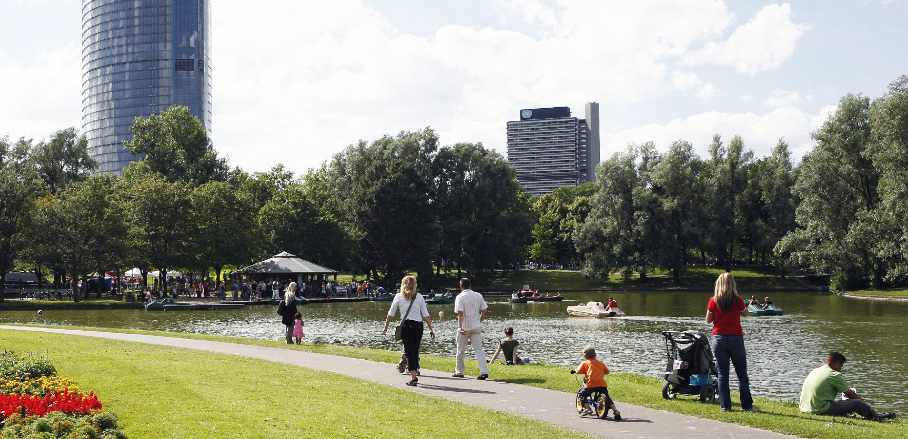Building Bridges for Resilience: Bonn’s Impactful Network for Change
Resilience and preparedness are vital conditions for safeguarding the future of our cities. Stefan Wagner, Head of Germany’s Office for International Affairs and Global Sustainability in Bonn, illuminates the city’s new role as an MCR2030 Global Resilience Hub.
The city of Bonn, Germany, has recently been labelled as a global MCR2030 Resilience Hub. Instead of perceiving this just as an acknowledgement of its resilience achievements, the city sees it as a responsibility to be willingly embraced. Joining the ranks of 23 cities recognised as Resilience Hubs – such as Makati City in the Philippines and Malmö in Sweden – Bonn is committed to bringing local and regional governments together to advance resilience efforts.
Global Resilience Hubs, as part of the MCR2030 campaign, are communities with a proven track record in disaster risk reduction and resilience. These communities are dedicated to supporting and mentoring other municipalities, fostering city-to-city collaborations, and providing peer-to-peer support. The hubs play a critical role in knowledge sharing, capacity building, and creating learning opportunities, inspiring other local governments to commit to greater resilience.
With that in mind, Bonn will take up our three-year term as a Resilience Hub with a deep commitment to mentoring and connecting to other cities, towns, and regions. These are the principles that are guiding the city’s work:
Global Learning Travels Both North and South
The city has looked globally for inspiration and sharing. For ten years Bonn has hosted the leading global forum for urban resilience: the Resilient Cities Congress Series. In 2020, the congress expanded to create Daring Cities, a forum focused on tackling the climate crisis more broadly. Over the years, Daring Cities has brought together more than 12,000 participants, fostering a robust community of urban resilience practitioners. The fourth edition of Daring Cities is set to commence in June 2023.
Bonn has long prioritised cross-border collaboration, particularly with cities in low and middle-income countries (LMIC). Through partnerships with sister cities – such as Cape Coast, Ghana; La Paz, Bolivia; Chengdu, China; Ulaanbaatar, Mongolia; and Bukhara, Uzbekistan – Bonn has actively tackled climate adaptation, resilience, and disaster management challenges.
As a Resilience Hub, Bonn plans to leverage its local partners and networks to raise awareness about MCR2030 and disaster risk reduction. In this regard, the city focuses on its residents, other cities in Germany and Europe, as well as their sister cities in LMIC. The city intends to extend its outreach and address a larger resilience community by conducting online activities and international conferences.
Building a Network of City-based Strengths with Global Impact
Furthermore, Bonn fosters a unique approach to networking and collaboration, centred around UN Bonn, international organisations, academia, and civil society. Sustainability is the common thread that connects them within various thematic networks. The City of Bonn plays an integral role in these networks by supporting their activities and outreach efforts.
The Bonn Network of International Civil Protection and Disaster Risk Reduction (the Bonn Network ICPDRR) was initiated by the City of Bonn, bringing together UN stakeholders, local level actors, academia, first responders, and humanitarian aid experts on a global scale. Each network member contributes unique knowledge, capacity, and experience, combining scientific expertise with implementation know-how to enhance capacity building, education, and awareness raising. Moreover, the network offers various events and communication channels to raise the capacity of all participants.
Finding Opportunities to Create More Connection
As a main activity of the MCR2030 Resilience Hub Bonn, a co-hosted webinar series by Bonn and ICLEI (Local Governments for Sustainability) starts this summer, covering various resilience-related topics, from risk communications to gender and vulnerability, and welcoming local and regional governments from around the world.
Additionally, as one of its first activities as an MCR2030 Resilience Hub, the Bonn Network ICPDRR established a new working group on risk communication, that focuses on the practice of tailoring risk messaging to target audiences.
As an initial project, the group considers developing a survey project on risk awareness and the impact of risk communication, ideally to be conducted and analysed by students in collaboration with the City of Malmö, another MCR2030 Resilience Hub, and their local university. Other possible research topics include enhancing the impact of local risk communication and analysing collaborations between different levels of governance in the field of disaster risk reduction. The research involves direct communication with academic network members in various research and academic institutes as well as teaching in relevant university classes.
Resilience – a Critical Piece in Bonn’s Climate Puzzle
During the past decade, the city of Bonn has adopted not only a sustainability strategy but also several sectoral strategies and action plans addressing resilience and preparedness. These include an integrated climate protection concept, a biodiversity strategy, and more specific concepts for flood protection and disaster response. Resilience has been built into all these strategies.
Furthermore, our newly established connections provide opportunities for innovation and engaging new audiences, such as a Youth Adaptation Forum, and a Hackathon in cooperation with the University of Bonn. We will continue to explore how to deepen and strengthen the role of resilience during our term as an MCR2030 Resilience Hub.
